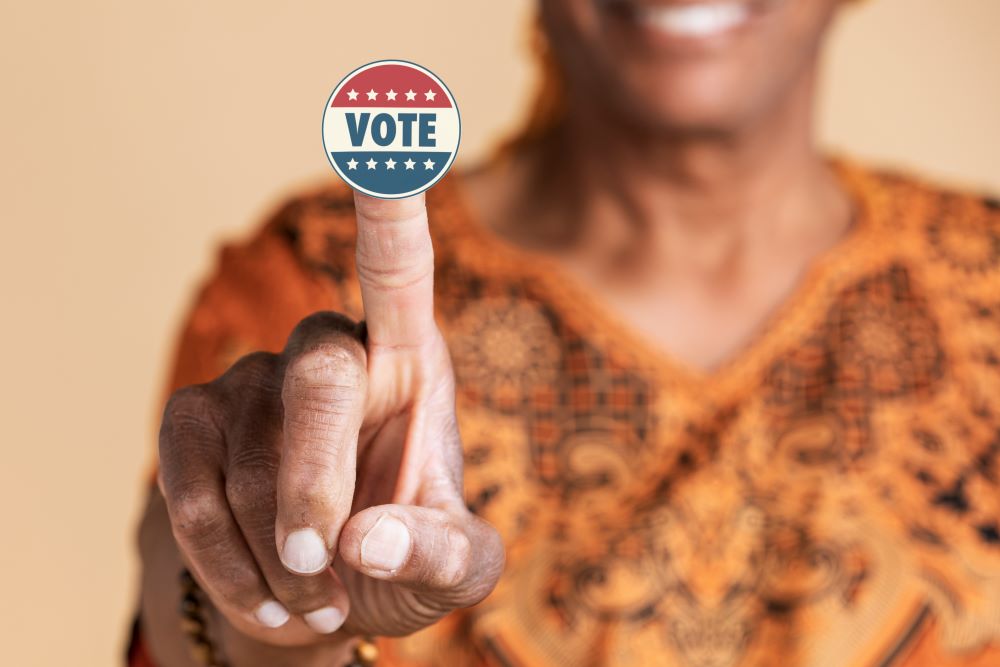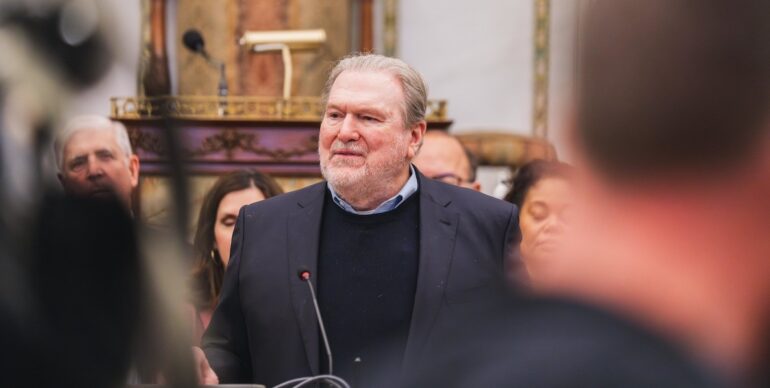-
play_arrow
WURD Radio
A Place to Call Home: Philly’s Mayoral Candidates on Housing Challenges

WURD Listeners at the Paul Robeson House asked the candidates about housing.
By Denise Clay-Murray
If you haven’t had the chance to visit the Paul Robeson House, you really should.
The house, located at 4951 Walnut St., was the home of the actor, athlete, and activist who found himself in the crosshairs of the House Un-American Activities Committee for his Civil Rights activities. It’s operated by the West Philadelphia Cultural Alliance.
Recently, the street outside of the Paul Robeson House was renamed for this historical figure. WURD listeners were treated to a live remote at the event, which not only commemorated Robeson’s birthday, but also the anniversary of Hall of Famer Jackie Robinson integrating Major League Baseball.
While it was a warm, sunny day where attendees could snack on hot dogs and water ice and tour the Robeson House, the May 16 mayoral primary wasn’t far from the minds of many. Because of this, it seemed like a good place to get candidate questions for WURD’s Every Voice, Every Vote segment.
As always, WURD listeners came up with some insightful questions that were then passed on to the candidates. These questions focused on the subject of housing.
There was a topic that a listener from Germantown says she hadn’t heard much about in any of the forums she’s witnessed. That topic: rent control. So, she asked the candidates about the topic herself.
While none of the candidates support true rent control, which would freeze the rent on an apartment indefinitely, everyone had some sort of solution to the problem of affordable housing.
“I think the answer is providing rent subsidy,” former Controller Rebecca Rhynhart said. “Rent control creates issues for Mom and Pop landlords and others. But rent subsidy gets at the same problem. So, that’s what I support.”
Entrepreneur Jeff Brown believes the problem can be solved through real estate taxes and through incentivizing landlords.
“I will put a 5% annual cap on real estate taxes to help curb rising rental prices and gentrification,” he said. “The city should also be providing incentives for owners/landlords to build and maintain affordable housing for rental. The city should also create incentives for developers who commit to developing more affordable housing. “We have to re-envision the way the City’s Land Bank is structured and administered. As Mayor, my goal will be to dramatically reduce the Land Bank inventory, transferring properties to builders and developers who commit to building and maintaining affordable housing for Philadelphians.”
Former City Councilmember Helen Gym got legislation passed that addressed the city’s eviction crisis. According to her website, Gym says she’ll prioritize public land for affordable housing and reshape the Housing Trust Fund in a way that allows it to increase the amount of affordable housing.
Of all the candidates in the race, Allan Domb has probably had the most experience with rental properties. He believes that the discussion has to go beyond rent control.
“Allan believes we should not discuss the need for more affordable housing as if it exists in a silo,” according to Domb’s campaign. “Philadelphia is facing an affordable housing crisis and we need to increase the availability to housing generally by repair and rehabilitation of existing housing stock and continue construction of new units. The City must also work to efficiently and responsibly transfer city-owned or vacant land to projects that will produce more affordable housing where most needed. Most importantly, we need to reduce the demand for rent controlled units by increasing the number of people working at good wages, which will make it easier for residents to choose among housing options.”
Another listener asked what the candidates would do regarding the 10-year-tax abatement. She also asked the candidates would do about a development trend that bothering her: apartment buildings in neighborhoods comprised mostly of rowhomes.
To Rhynhart, both of these issues can be addressed through policies that prioritize fairness.
“I’m a strong believer that the community needs to be able to decide what goes on in their community,” she said. “I plan to have a citywide housing policy as mayor, working in conjunction with council members, so that we have a vision across our city.”
“The tax abatement is a tax policy tool,” Rhynhart continued. “I think that we might want to look at the abatement for something like encouraging the building of affordable housing. But there’s also issues with unfairness with as property taxes rise. You have people who are tax abated that aren’t paying anything, while people right next door to them are paying huge amounts and that has to stop.
When the original 10-year-tax abatement was put together, the city was in a much different place regarding development, Domb said. While he supports having an abatement available, it’s time to change how it’s used and why.
“He thinks it was helping build too many one-bedroom apartments downtown and in “hot” neighborhoods, but not being used to help foster housing for families
in every neighborhood,” according to a spokesman for his campaign. “He also voted to reduce the period of the abatement to make it shorter. He would support abatements for development of affordable housing, as the PHA is the largest beneficiary of the current abatement program.”
Brown, however, believes that the abatement has run its course and needs to go.
“I do not support tax relief that has no benefit to the city,” he said. “If the city is going to offer tax incentives under my administration, there would be no free tax abatements to support corporate welfare without benefit to the residents of our city, like creating new jobs or helping to promote diversity, equity, and inclusion. Real estate taxes should be capped at 5% so that nobody’s taxes could increase 50% or 100% in a year. I also plan to have an advocate under my administration to help underserved individuals take advantage of our existing programs like the Homestead Rebate and long-term residence programs. If possible, I would like to make these programs automatic, so the city has the obligation to reach out to residents and provide these services rather than requiring residents to seek them out.”

This article is a part of Every Voice, Every Vote, a collaborative project managed by The Lenfest Institute for Journalism. Lead support is provided by the William Penn Foundation with additional funding from The Lenfest Institute, Peter and Judy Leone, the John S. and James L. Knight Foundation, Harriet and Larry Weiss, and the Wyncote Foundation, among others. To learn more about the project and view a full list of supporters, visit www.everyvoice-everyvote.org. Editorial content is created independently of the project’s donors.
THE WURD WEEKLY NEWSLETTER
Black Talk Media sent straight to your inbox.
BECOME A MEMBER
The forWURD Movement is your way to
protect and preserve Independent Black Media.
Written by: Associated Contributor
2023 Mayoral Race Denise Clay-Murray Every Voice Every Vote Mayoral Candidates onWURD Paul Robeson House pennsylvania philadelphia philly politics voting wurd radio
Featured post
Latest posts

This week on WURD: Trump’s “mega bill,” Medicare cuts, U.S.-Iran tensions

Teens Cultivate Soil and Safety at Sankofa Community Farm

This week on WURD: Musiq Souldchild shares his journey, PA’s budget delays, Sherri Shepherd’s latest role

This week on WURD: Philly teachers on strike, SEPTA’s funding issues, Sankofa through farming

This week on WURD: I.C.E. in Los Angeles, “No Kings Coalition” march, Philly Black business market
Current show
Upcoming shows

Soulful Sunrise
6:00 am - 7:00 am

Wake Up With WURD
7:00 am - 10:00 am

ecoWURD Magazine
10:00 am - 11:00 am

The Source with the Black Women’s Leadership Council
11:00 am - 1:00 pm

GROUNDINGS with Brother Shomari
1:00 pm - 4:00 pm
WURD Radio LLC © 2012-2021. All rights reserved.







Post comments (0)